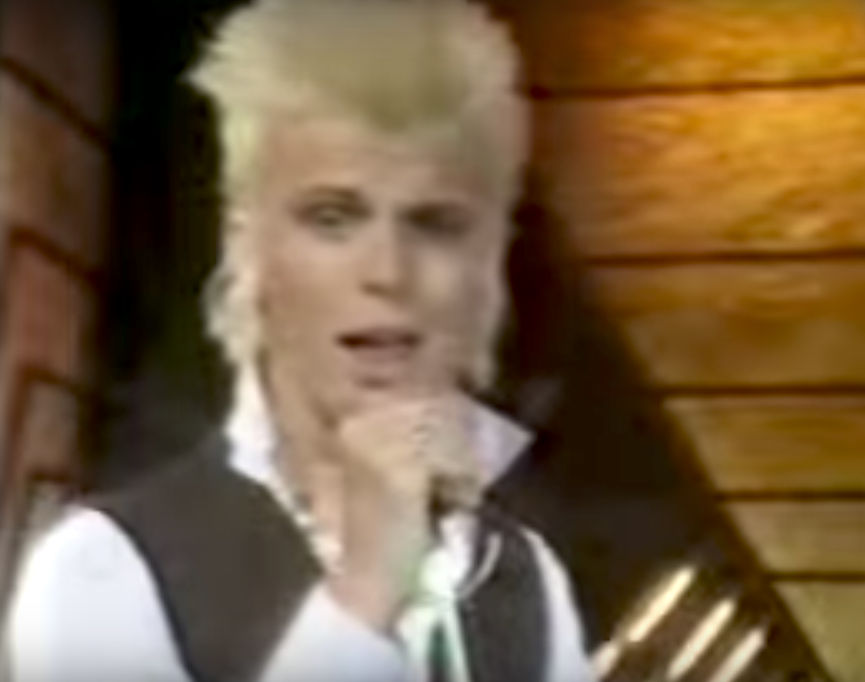Generation X, Billy Idol, and Me
Billy Idol, mid-sneer
Why the hell has Generation X been back in my head? I listened to them a whole bunch around 9th grade, then dropped them for “real” punk bands. Like, you know, the Cure.
Once or twice, a band or artist has muscled its way into my consciousness to foretell a death, as it did before the passing of Ellas McDaniel (aka Bo Diddley). Perhaps I’m subconsciously attempting to trigger the timely demise of Billy Idol?
Generation X are not my favorite band of the punk era. Were they even punks? The band was stylish, clean, musically sharp and oh so camera-ready. Even when I first heard them, as a gormless teen, I suspected they were fakes (“poseurs” wasn’t yet in my vocabulary, but it’s the perfect descriptor). The lyrics are too self-celebratory and pat, the dramatic shadings a bit too practiced. If anyone still remembers Generation X, it’s as the launching pad for the roaming toxin—yes, I use that term advisedly—that is Billy Idol.
None of this stopped me from falling hard for that first album (the American release, the one that leads off with the breakneck, chomping-at-the-bit cover of John Lennon’s “Gimme Some Truth”). Whatever the band’s flaws, the album is a nearly unabated flood of adrenaline, thanks mainly to the killer team of Bob “Derwood” Andrews on guitar and Mark Laff on drums. And those aforementioned moments of high drama—like the crashing 1000-guitar entrance in the second verse of “Kiss Me Deadly”—are simply undeniable.
Not their best song by a long shot. But a nifty "behind-the-scenes" moment from Don Letts' essential "Punk Rock Movie"
As every graduate of the D.C. scene knows, Andrews and Laff would go on to form the short-lived and almost entirely forgotten Empire; their lone, fascinating album of mysterious, proto-emo guitar rock remains a touchstone for many subsequent Dischord bands. By contrast, the “masterminds” of Generation X—Tony James and Idol—would go on to give us Sigue Sigue Sputnik and, well, “Flesh for Fantasy,” respectively.
Hear any D.C.-style post punk in this song?
Playing a characteristically bright, overdriven Strat, Derwood could sneak incisive and crystalline riffs into the unlikeliest of places, and when he slipped off leash entirely—most notably during the truly unhinged album closer “Youth Youth Youth”—the results were unforgettable.
“Explosive” may be a lazy descriptor for a drummer, but Laff owned that label with rare control. Alternately economical and expressive, he brought nuance and power to what was all too often the one-dimensional thrash of the early punk era. No other band of the day could pull off the mechanical 8th-note chug of songs like “Your Generation” and “Kleenex” with such teeth-gritted drive and precision. Even today, when I’m unable to ignore Generation X’s patent fakeness, it’s impossible to resist the sheer velocity and power of that first record.
Title track from the less-even second album.
That’s the what of Generation X; but why the why? Why have they percolated to the top of my consciousness now? Of course, so much of it has to do with when I heard them. As an alarmingly awkward and hormone-addled teen, I seemed destined for life as a permanent loner. So clearly trapped where I didn’t belong—in a snooty private school—I had not only not found my tribe, I didn’t think it could possibly exist. In my favor, I had discovered the bass guitar, and some dim voice told me this would be my salvation. But when? And how?
U2 poster; Rush shirt. Note fedora held in reserve, the better to "seal the deal."
One day in 9th grade, a jockish Junior approached me.
“Are you Seth?”
I flinched, instinctively. “Yes?” I croaked.
“Do you play bass?”
I straightened up a bit. “Uh…..yes?”
Do you want to come try out for our band?
I’d like to say what followed over the next year or so was a whirlwind: Musical heights conquered, critical acclaim, popularity and fame. None of this actually happened, but the moment was a real pivot point in my life, perhaps the one that saved it. The band—Red Square (It was the 80s)—and its songs are not worth remembering, but for the first time, I understood the word “band” in its original meaning. A band is a tribe, if a temporary one, united in purpose, building its own creation myth and its own language, drawing upon the singular lifeblood of camaraderie. It was an experience I’d never known, or even suspected could be known. I was hooked.
Of course, we needed existing music to learn, the better to form our own weak copies of later. I wasn’t new to punk; my savvy half-sister had already seen to that, and the Cars and Police—yes, I know—were being displaced by the Buzzcocks, Pistols, Jam and Specials. But when the drummer of my nascent band put on Generation X, something coalesced for me. The music was so sharp, so tight and focused; they were so clearly a band; they so clearly shared their own language and their own myth (even if Derwood would later describe Billy Idol as something akin to “a massive pit of sadness”). At last, I’d found my mountain to walk towards.
Generation X isn’t my “Rosebud,” not by a long stretch. But I can’t help but be touched by their adrenalized debut, the sympathetic resonances they sparked in my own story. The band just drips with energy, with optimism, with gameness.
Do you need to go and revisit it? No, you do not. But if you do, maybe you too will get a little hit of the fire and spark it lent me so many years ago. And maybe, just for a brief moment, it will redeem the hideous, semen- and Botox-filled sac called Billy Idol.
The band in reunion mode; note singer's tasteful "Predator in pyjamas" stylings.


